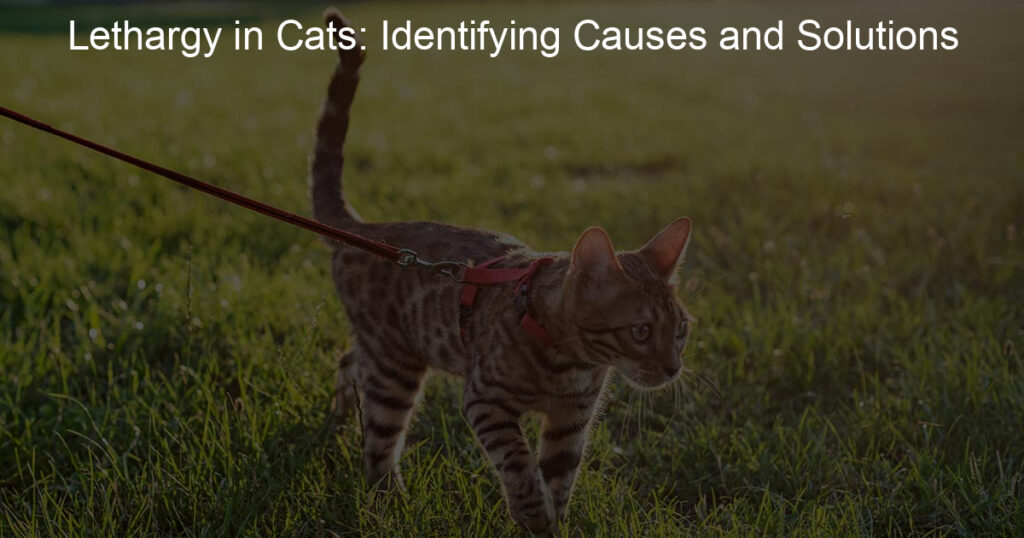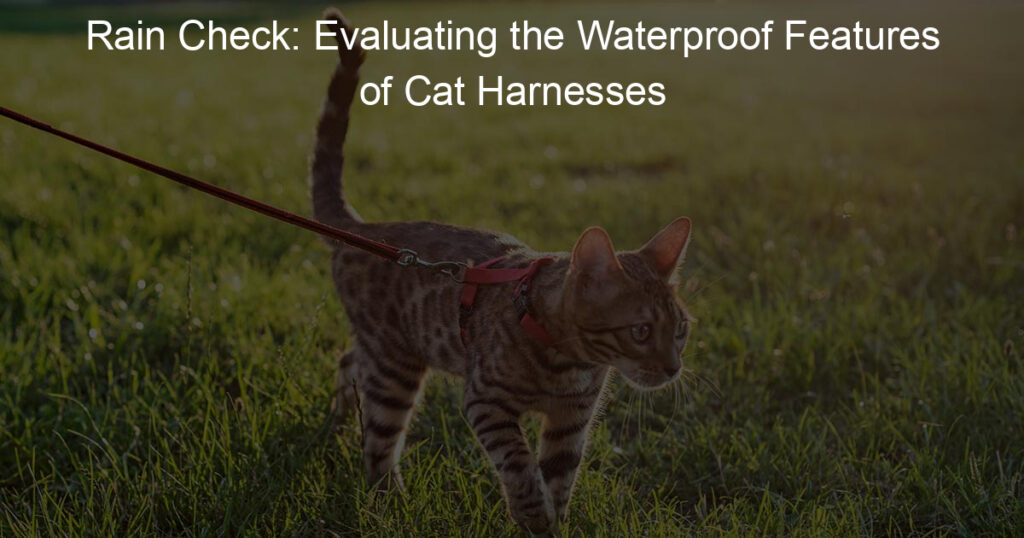Lethargy in cats can be a concerning issue for many pet owners. As a devoted cat owner myself, I understand your worry when watching your feline friend lack energy and not engage in their usual activities.
It’s essential to be aware of the possible causes and symptoms of lethargy in cats to ensure their well-being.
In order to assist your cat, it is crucial to have an in-depth understanding of lethargy and recognize specific behaviors that may indicate a more severe issue.
Additionally, knowing how age can play a significant role in feline lethargy will help you address age-related health concerns.
Being knowledgeable about diagnostic procedures, treatments, and medications allows you to take appropriate action when needed.
Key Takeaways
- Recognizing common symptoms can help you identify lethargy in cats
- Understanding potential causes and specific illnesses can aid in addressing feline lethargy
- Awareness of diagnostic procedures and treatments is vital to ensuring your cat’s well-being
Common Symptoms
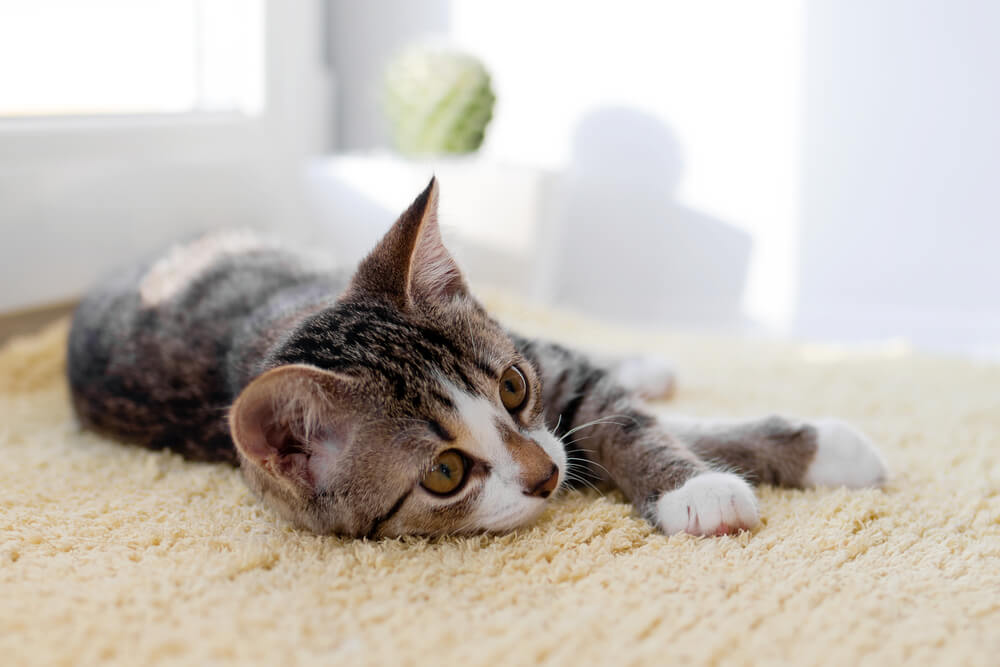
As a cat owner, I’ve observed various symptoms of lethargy in my feline friends. It’s vital to recognize these signs to provide proper care and support.
The most common symptoms include:
- Loss of interest: Cats may suddenly display a lack of interest in their surroundings or activities they used to enjoy. They may not engage in play or exploration as they once did.
- Decreased activity level: Another typical sign of lethargy is diminished activity levels. A lethargic cat may spend more time lying down or sleeping than usual, and they may not move around as much as they once did.
- Sleepiness: Lethargy can manifest as excessive sleepiness, and you might find your cat sleeping far more than normal. This can be a sign that they are not feeling well or that their energy levels are low.
- Fatigue: Even when they’re awake, you may notice your cat appearing fatigued or listless. They might have trouble lifting their head or struggle to complete their regular grooming routine.
- Tiredness: This is often a more subtle symptom, but you may find that your cat tires more easily than before. They might become winded more quickly during play or grow weary from activities that once seemed effortless.
These are just a few of the most common symptoms of lethargy in cats. It’s essential to keep an eye on your cat’s behavior and take note of any changes.
If you suspect your cat is experiencing lethargy, consulting with a veterinarian is key to ensuring their health and well-being.
Potential Causes
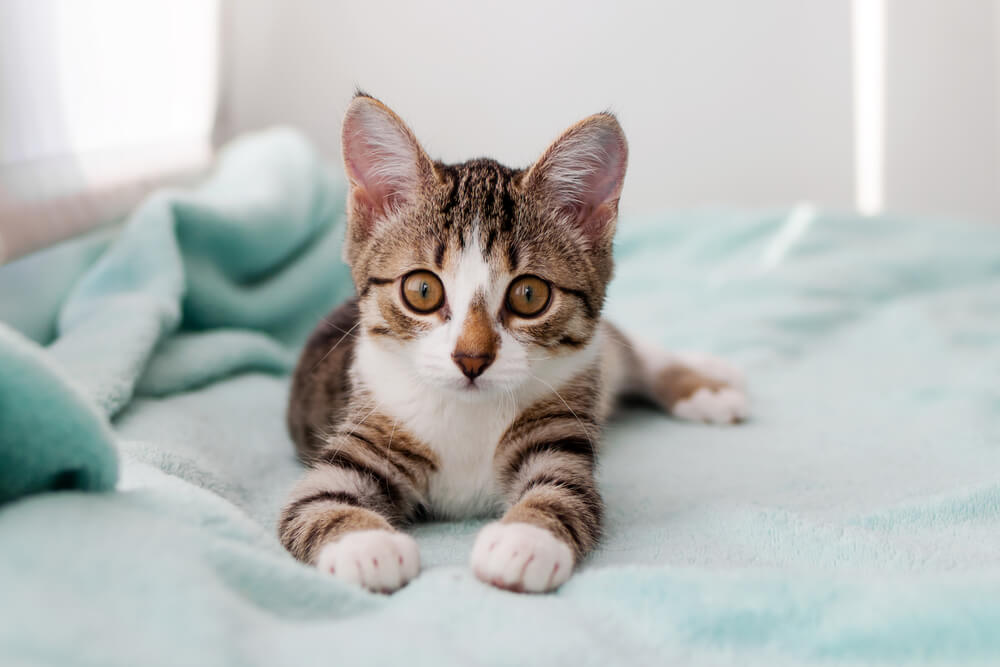
I believe one of the main causes of lethargy in cats is illness. Cats can suffer from a variety of infections and diseases, such as parasites, bacteria, and viruses.
These can include common ailments like upper respiratory infections or more serious conditions like heart disease and kidney disease.
Injury is another potential cause of lethargy in cats. If a cat experiences trauma, such as a fall or being involved in a fight, it might become lethargic while its body attempts to heal.
Arthritis can also contribute to lethargy, as it causes joint pain and stiffness, which can make a cat less active.
Dehydration and fever can also lead to lethargy in cats. If a cat is not drinking enough water, its body cannot function properly, and a fever can cause a cat to feel weak and tired.
Also, stress and anxiety can have an impact on a cat’s energy levels, making them more prone to lethargy.
There are many other potential causes of lethargy in cats, such as abscesses, bacterial infections, and exposure to toxins. Nutritional disorders can also lead to lethargy, as an improper diet can result in a cat not receiving the necessary nutrients to maintain energy levels.
Obesity, too, can cause a cat to become more lethargic, as carrying excess weight can be physically tiring.
Cats can also suffer from various infections, such as heartworm, gastrointestinal disorders, and immune diseases, which can lead to lethargy. Hypoglycemia can affect a cat’s energy levels, as low blood sugar is a primary source of energy for the body.
Finally, neurologic disorders can cause lethargy, as they can affect a cat’s ability to maintain a normal level of activity and consciousness.
There are numerous potential causes of lethargy in cats, ranging from illness and injury to infections and dietary issues. It is important to consult with a veterinarian if your cat is displaying signs of lethargy, as a proper diagnosis and treatment are crucial to restoring your cat’s health and well-being.
Specific Illnesses
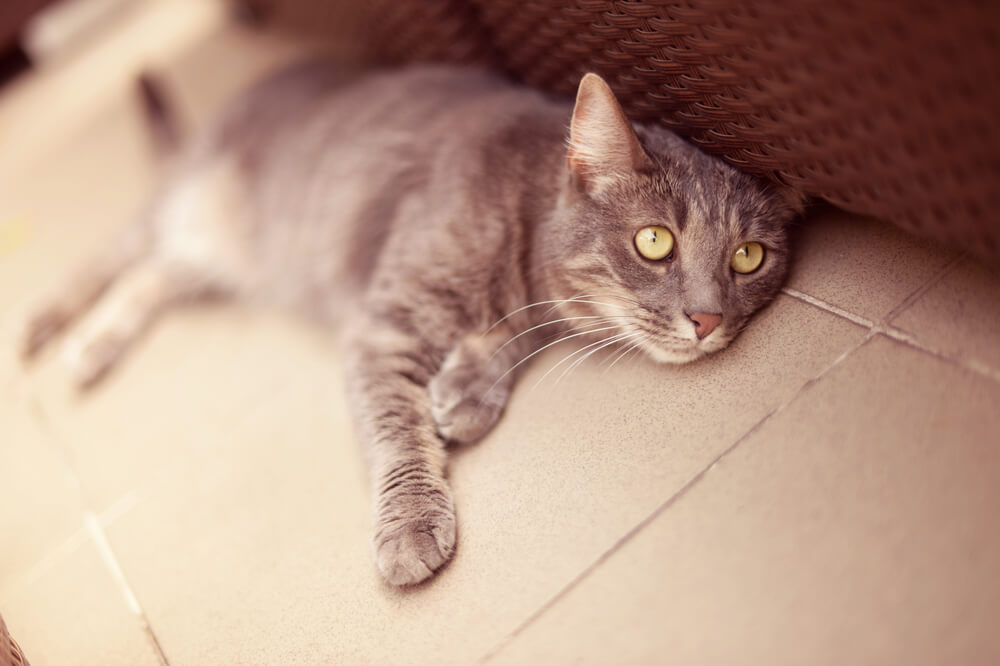
As a cat owner, I have observed that lethargy in cats can be caused by various specific illnesses.
I have listed some common illnesses that could contribute to your feline friend’s lethargy.
Diabetes: I understand that diabetes is a common illness in cats, often resulting from insufficient insulin production or poor response to insulin. If left untreated, it can cause multiple health complications, including lethargy and muscle weakness.
Cancer: As I know, cancer can affect cats just as it affects humans. Cats with cancer may experience lethargy due to the body’s attempt to fight off abnormal cells, pain, or discomfort caused by tumor growth.
Anemia: I’ve found that cats can become anemic due to a variety of reasons, such as blood loss or a decrease in red blood cell production. Anemic cats often exhibit lethargy as their bodies struggle to transport oxygen to vital organs effectively.
Liver Disease: If my cat has liver disease, I am aware that it can cause lethargy. The liver is responsible for detoxifying the blood, and when it isn’t functioning properly, it can lead to a buildup of toxins, resulting in lethargy and other symptoms.
Depression: Cats can experience depression, which may lead to lethargy. Depression in cats may be caused by factors such as sudden changes to their environment or the loss of a beloved family member or pet.
Hyperthyroidism: I know that hyperthyroidism is a condition where a cat’s thyroid gland produces excessive amounts of thyroid hormones. Symptoms often include increased appetite, weight loss, and lethargy.
Respiratory Disease: Respiratory diseases such as asthma or pneumonia can cause cats to become lethargic due to lung inflammation, discomfort, or difficulty breathing.
Diabetes Mellitus: Similar to diabetes, diabetes mellitus is a condition where a cat’s body doesn’t produce enough insulin or doesn’t use it properly. Lethargy can be a symptom of this disease, as the cat’s body struggles to utilize glucose for energy.
In conclusion, it’s essential to monitor your cat’s health and consult a veterinarian if you notice signs of lethargy, as it can be an indicator of underlying illnesses.
Significance of Age
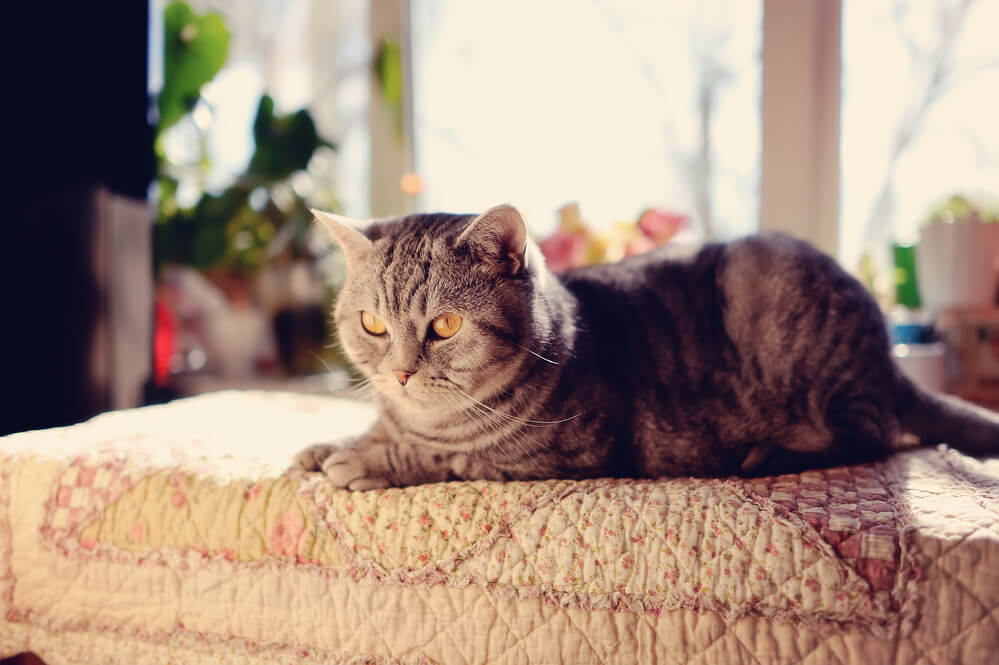
As a cat owner, I’ve observed that age plays a significant role in the expression of lethargy in cats. When considering the impact of age, it’s essential to understand the different stages of a cat’s life, mainly focusing on kittens, young and adult cats, to senior cats.
In my experience, kittens are generally full of energy and curiosity. However, they do have moments of sleepiness, especially during their growth spurts. Their seemingly endless amounts of energy can deplete quickly, leading to bouts of lethargy.
Although this is usually normal, it’s best to keep an eye on young kittens for any signs of illness or injury that could be causing their lethargy.
On the other hand, adult cats tend to have a more predictable daily routine, balancing playtime and rest. At this stage in their lives, it’s relatively easy to recognize any changes in their activity levels or energy expenditure.
Any sudden or prolonged lethargy may indicate underlying health issues that warrant a visit to the veterinarian.
As cats age and become seniors, they often experience a decline in their energy levels. I have noticed that senior cats display more moments of lethargy and general fatigue than their younger counterparts. This slowdown is often a natural part of the aging process.
However, it’s essential to monitor them closely, as certain age-related health concerns, such as arthritis or kidney issues, can also lead to an increase in lethargy.
Each age group has unique characteristics and factors that contribute to the presence of lethargy. Having a good understanding of these differences allows me to better care for my cats and to proactively address any concerning behaviors.
Diagnostic Procedures
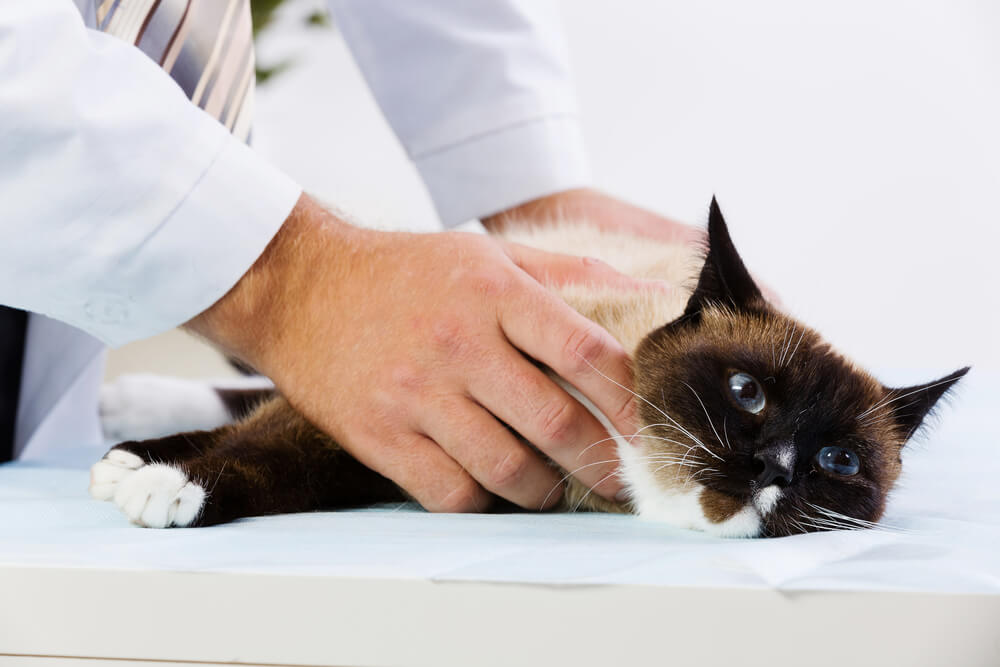
When I am faced with lethargy in cats, I understand the importance of conducting a thorough examination and diagnostic tests to identify the underlying cause. As a knowledgeable individual, I am confident in sharing the key diagnostic procedures that your veterinarian may perform to assess a lethargic cat.
First, I recognize that a detailed physical examination is crucial. The veterinarian will carefully evaluate the cat’s overall health, looking for signs of pain, dehydration, or fever.
They will listen to the cat’s heart and lungs, palpate its abdomen, and check for any abnormalities.
In addition to the physical examination, the veterinarian may recommend X-rays for a detailed assessment of the cat’s internal organs.
X-rays help identify potential issues such as fractures, tumors, or foreign objects that could be causing the lethargy.
The veterinarian may also perform bloodwork, which is essential in understanding the overall health of the cat. By evaluating the results of various parameters such as red and white blood cell counts, liver and kidney function, and electrolytes, the veterinarian can identify potential issues and monitor the cat’s progress over time.
Urinalysis is another vital diagnostic tool that can provide valuable information about a cat’s health. By analyzing the physical, chemical, and microscopic properties of the cat’s urine, the veterinarian can detect any abnormalities that may indicate urinary tract infections, kidney stones, or other health issues.
Lastly, the veterinarian might conduct an ultrasound to evaluate the cat’s organs in real time. This non-invasive imaging technique provides a detailed view of the cat’s internal structure, allowing the veterinarian to identify any abnormalities such as tumors, cysts, or inflammation.
These diagnostic procedures enable a clear and confident understanding of the cat’s condition, allowing the veterinarian to formulate an appropriate treatment plan.
Treatments and Medications
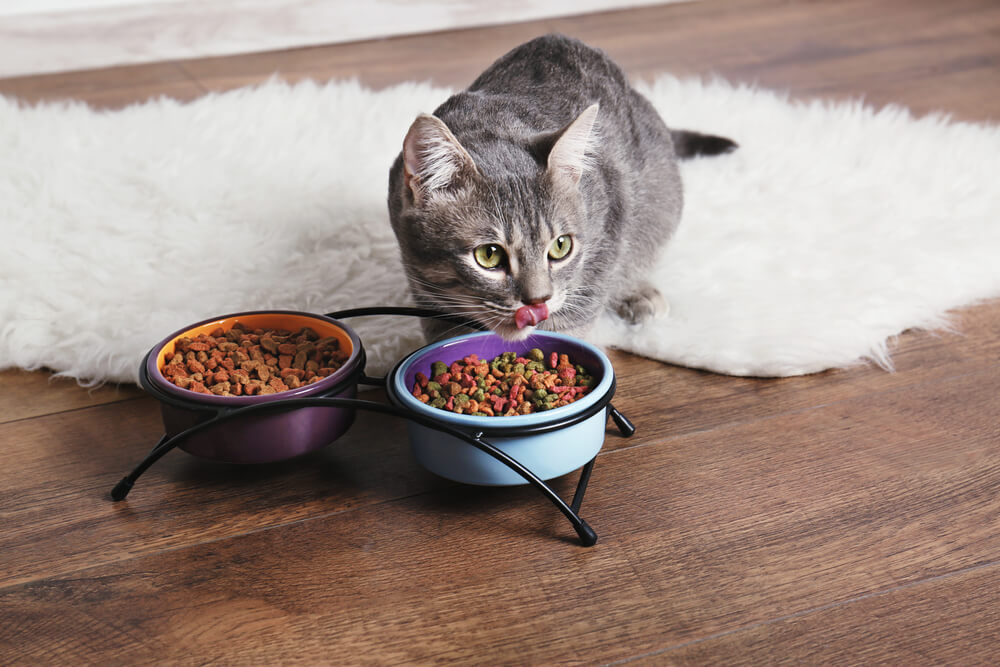
When it comes to lethargy in cats, I approach the treatment based on the underlying cause. If the cause is an infection, I recommend consulting a veterinarian who may prescribe antibiotics to help combat the infection.
It’s important to administer the antibiotics as directed to ensure the infection is effectively treated.
In some cases, cats may require supplements to help boost their energy levels and overall health. Supplementing their diet with essential nutrients such as taurine, arginine, and vitamin B12 can be beneficial.
It’s crucial to consult a veterinarian before starting any supplementation regimen, as they will provide the appropriate dosage based on the cat’s individual needs.
Parasitic infestations, particularly worms, could also be a cause of lethargy in cats. A deworming treatment might be necessary in such cases. Dewormers are available in various forms, such as oral, topical, or injectable solutions.
A veterinarian can help determine which type of treatment is best for the cat and prescribe the correct dosage.
In more severe cases where the lethargy is caused by a more serious medical condition, surgery may be required. The need for surgery will depend on the specific condition, and the veterinarian will be best suited to make that decision.
Following the surgery, proper post-operative care must be provided to aid in recovery.
Please remember it’s important to consult a veterinarian for a proper diagnosis and treatment plan tailored to the cat’s specific situation.
Preventive Measures
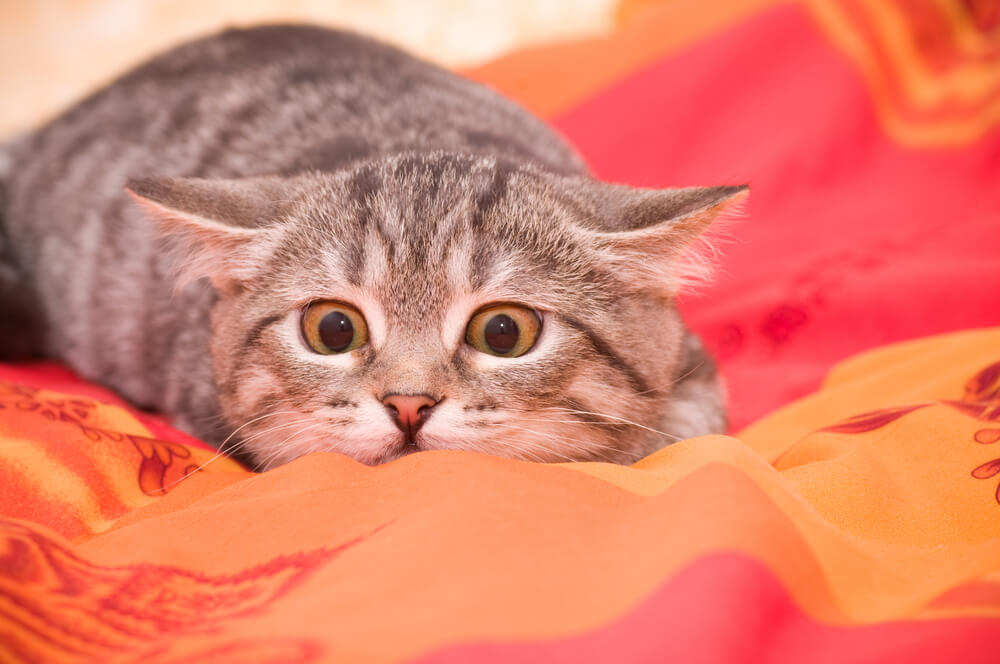
First, let’s talk about the importance of proper nutrition in preventing lethargy in cats. A balanced and nutritious diet is essential for their overall health and well-being.
I recommend providing high-quality, age-appropriate cat food for your feline friend, as this will help maintain their energy levels and keep them active.
Make sure their water bowls are always clean and filled with fresh water to ensure proper hydration.
Vaccination is another essential aspect of your cat’s health. Vaccines help protect your cat from various illnesses and infections, some of which can cause lethargy. It is important to consult with your veterinarian to determine the appropriate vaccine schedule for your cat’s specific needs.
Remember to take your cat in for regular check-ups and booster shots to keep their immune system strong.
Keeping your cat’s environment clean and engaging can help prevent the development of lethargy. Make sure your cat has a comfortable, clean space to relax and plenty of opportunities for mental stimulation and exercise.
Provide toys and scratching posts for play and entertainment, as well as a quiet, cozy area for your cat to rest. Regular grooming, parasite prevention, and dental care can also contribute to their overall well-being.
And finally, closely monitor your cat’s behavior and energy levels. Identifying any changes in their activity early on can help you address potential health concerns before they become more severe.
By following these preventative measures, you’re setting your cat up for a happy and healthy life, free of lethargy.
Specific Behaviors
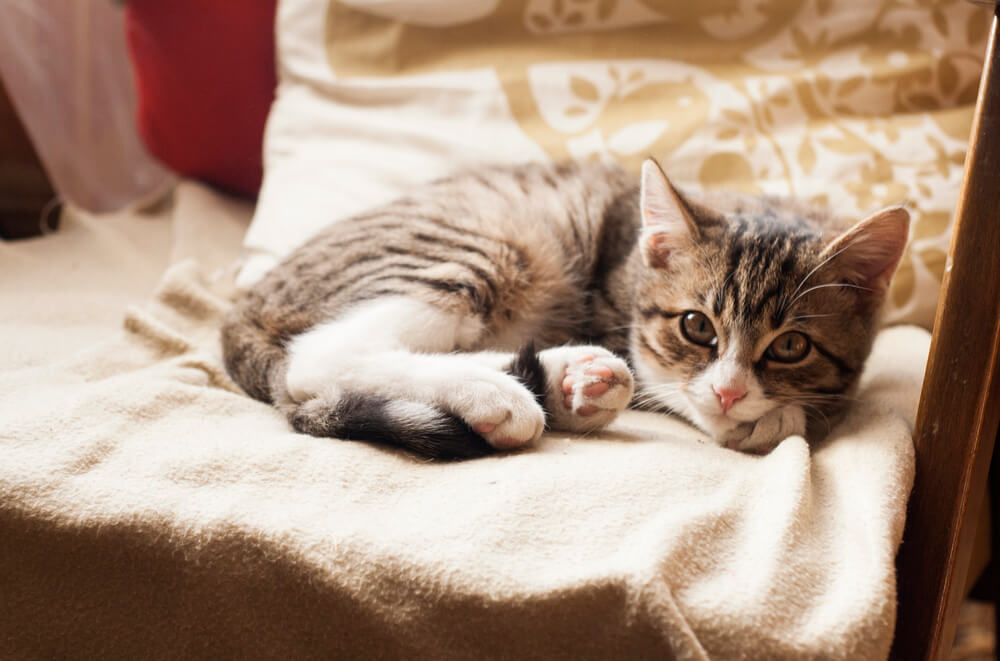
As a cat owner, I’ve noticed that lethargy in cats can manifest in various ways. One of the most common symptoms is a noticeable decrease in activity levels. My cat used to be playful and energetic, but now it spends most of its time resting or sleeping.
With this lack of energy, engaging in their usual activities, such as climbing or hunting, becomes challenging and less frequent.
In some cases, lethargy in cats might be accompanied by weight loss. I’ve observed that my cat has been eating less, leading to a gradual decrease in body weight. This could be due to an underlying health issue, such as anemia, which is known to cause fatigue and general weakness in cats.
If I see any signs of diarrhea, vomiting, increased thirst, or more frequent urination, I would consider these as potential red flags that warrant a visit to the veterinarian.
Cats are known for their meticulous grooming habits, but when they’re feeling lethargic, they might neglect this aspect of their routine. I’ve seen that when my cat is experiencing lethargy, its coat may become dull and unkempt, indicating a lack of energy to maintain proper grooming.
This decline in self-care could also result in weight gain due to the cat’s inactivity and decreased desire to play or exercise.
It’s essential to keep a close eye on any changes in my cat’s behavior. Lethargy is not just about being tired; it can indicate a more severe underlying issue that requires professional attention.
Always be diligent in observing my cat’s specific behaviors to ensure I can provide the proper care and support.
In-Depth Understanding of Lethargy
Lethargy in cats can be a confusing and worrisome issue for many pet owners, especially when the feline friends that we love seem to be sleeping more, moving less, and displaying a general lack of energy.
In my experience, understanding the symptoms and possible causes of lethargy is essential in determining whether it’s a temporary state or a sign of a more serious health issue.
The main symptom of lethargy in cats is a noticeable decrease in their activity levels. This may manifest as sleeping for extended periods, reluctance to play, or slow and uncoordinated movement.
In addition, they might show a lack of interest in food, grooming, or social interactions with humans and other animals. It’s important to note that occasional laziness or tiredness is natural and doesn’t necessarily indicate a problem.
Nevertheless, if these signs persist or worsen, it’s time to consult a veterinarian.
A temporary state of lethargy, lasting a day or two, can be caused by factors such as changes in routine, environment, or stress. Events like moving to a new home, the introduction of a new family member, or even a change in your cat’s diet can cause a short period of lethargy.
In these cases, it’s essential to monitor your pet closely and provide support, such as a quiet, comfortable space or extra attention to help them adjust.
On the other hand, persistent lethargy can be a symptom of an underlying health issue. Medical conditions such as diabetes, kidney disease, heart problems, or infections can lead to an ongoing lack of energy in cats.
Further, symptoms like weight loss, vomiting, or changes in thirst and appetite can point to a more severe problem that requires immediate veterinary attention.
Understanding lethargy in cats is crucial as it helps pet owners distinguish between a temporary state and a potential health issue.
While occasional episodes of lethargy might be within the realm of normalcy, consistent symptoms or those paired with other concerning signs warrant professional intervention.
Staying observant and attentive to any changes in your cat’s behavior and energy levels can ensure that you’re doing the best for your feline companion.
Frequently Asked Questions
What are the common causes of lethargy in cats?
There are numerous possible causes of lethargy in cats. Some common causes include:
- Overexertion or fatigue from engaging in physical activities
- Stress or anxiety causing disinterest in their surroundings
- Illnesses such as infections, anemia, and metabolic disorders
- Pain from dental issues, injuries, or arthritis
How can I treat a lethargic cat at home?
To help your lethargic cat feel better at home, you can:
- Ensure they have a quiet and comfortable resting space
- Offer fresh water and their favorite food
- Keep a consistent routine to reduce stress
- Monitor their temperature, appetite, and activity levels
- Gently massage or pet your cat, ensuring you do not cause discomfort
Remember, it is crucial to consult with a veterinarian if your cat’s condition does not improve or worsen.
When should I take my cat to the vet for lethargy?
You should take your cat to the vet if:
- Your cat’s lethargy lasts for more than 24-48 hours
- They refuse food or water for a prolonged period
- They display other concerning symptoms, such as vomiting, diarrhea, or difficulty breathing
What are the signs of an emergency in a lethargic cat?
Some emergency signs in a lethargic cat include:
- Labored or rapid breathing
- Pale or blue gums
- Loss of consciousness or seizures
- Significant injury, such as a broken bone or a deep bleeding wound
If your cat is showing any of these signs, seek immediate veterinary attention.
Can sudden lethargy in an older cat indicate a serious issue?
Yes, sudden lethargy in older cats can be a sign of serious health issues, such as:
- Kidney or liver disease
- Heart problems
- Cancer
If an older cat exhibits sudden lethargy, it is recommended to consult with a veterinarian as soon as possible.
How long should I wait to see if my cat’s lethargy improves before seeking help?
If your cat’s lethargy does not show any improvement within 24-48 hours, it is best to seek veterinary assistance. Moreover, if your cat’s condition worsens or if they exhibit other concerning symptoms, do not hesitate to consult with a veterinarian promptly.

